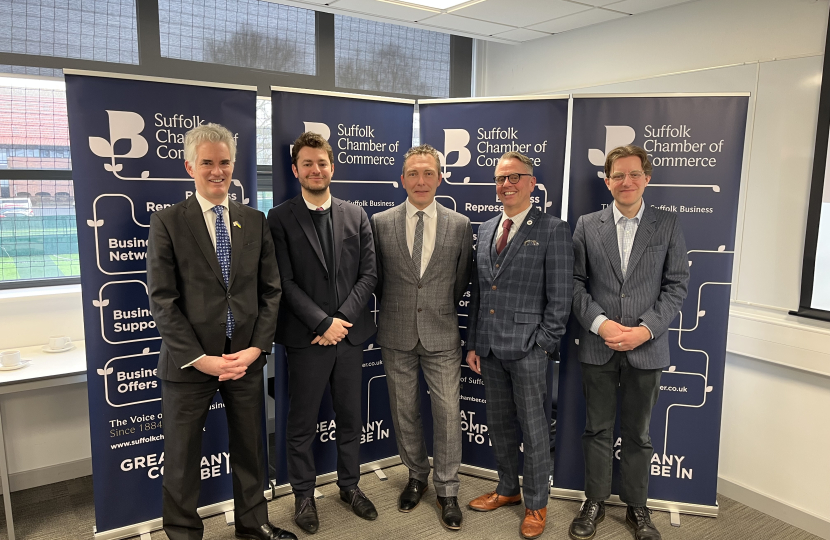
Rapid action must be taken to prevent frequent A14 delays having a catastrophic impact on Suffolk’s economy, business leaders have warned.
A report by Suffolk’s Chamber of Commerce released today has revealed the ‘crippling costs’ and impacts ‘constant’ closures on the A14 and Orwell Bridge have on businesses.
Titled ‘Broken Down: the economic impact of the A14 in Suffolk’, the report looked at the responses given by 350 firms across a variety of sectors.
Paul Simon, chamber head of public affairs, said the organisation was concerned the county’s economy could suffer due to companies scaling back plans, or leaving Suffolk altogether.
Highlights of the report include 87 per cent of respondents saying they were negatively affected by closures on the A14 in the past 12 months, with 51 per cent noting increased costs ranging from a few hundred pounds to £80,000 per year.
In addition, 49 per cent suffered lower client or customer retention and 32 per cent reported negative impacts on staff, such as childcare costs and recruitment issues.
Mr Simon said it would not rule out any solutions, including a renewed push for a Northern Bypass or upgrades to Copdock Interchange.
“We wanted to provide a report on the business community’s views on issues on the A14 and sub-road network,” Mr Simon said.
“While the opinions of the public are legitimate and paramount, we felt what was missing was the views of people who run and work for businesses.
“This is a call to decision makers, locally and nationally, to tackle these issues through a series of short, medium and long-term plans.
“We learned there is not a single aspect of doing business in the county not affected by the A14, leading to lost resources, extra costs and the human angle, such as childcare, retention and recruitment of new staff into the greater Ipswich area being impacted.
“One aspect is that the A14 is not fit for business.”
Mr Simon said that 84 per cent of respondents reported that the Orwell Bridge was either important or very important to the running of their business.
The future of the road network was also a major concern, he said, with 81 per cent worrying about bridge capacity going forward.
Of these, 85 per cent felt that, should there be no significant improvements over the next decade, their investment plans would be moderately or significantly impacted, while 83 per cent felt they could lead to job cuts.
In addition, 81 per cent felt the Orwell Bridge was the biggest source of disruption, followed by the knock-on effects of these closures (46 per cent) and Copdock Interchange (39 per cent).
However, due to the road being a major throughway to both the Port of Felixstowe and Sizewell C, the chamber felt this was an issue of national significance.
John Dugmore, chief executive of the chamber, said the report made for ‘sobering’ reading.
He added: “With no end in sight to the regular delays and closures across parts of this nationally vital road, many business owners and employers clearly feel abandoned by Government and National Highways.
“Some expressed outright hopelessness and the sense in which they were being expected to just put up with it by policymakers.”
Short-term solutions to the issues, the report stated, included the Ely and Haughley rail junctions, which could remove 98,000 lorries from the roads per year.
The chamber is set to commission precise data on the per hour costs of delays on the A14.
It has called on National Highways to improve its warning system for delays after 70 per cent of businesses said closures were poorly managed.
Finally, it hopes Ipswich Borough Council and Suffolk County Council would extend the Ipswich Transport Taskforce to cover the A14 and other roads outside its boundaries to scan for possible diversion routes for smaller vehicles.
Medium-term solutions (within the next 12 months) include having National Highways send officers to major incidents on the A14 and bringing forward plans for Copdock Interchange.
Longer term solutions (within the next two years) include calling for a Government taskforce to investigate increased capacity for roads in and out of Felixstowe as the Orwell Bridge nears the end of its lifespan.
Jack Abbott, MP for Ipswich, said there was no ‘magic bullet’ to solve these issues and some plans would take years to come to fruition.
He believed fixing the issues with the Orwell Bridge would be impossible without the construction of a Northern Bypass outside Ipswich.
Mr Abbott said: “We're entering a critical phase. Big companies like Maersk are looking to move down to the London corridor, as are others, possibly impacting thousands of jobs and taking away millions from our economy.
“We have maybe 20 years of the Orwell Bridge left. We’re going to see more closures and the situation is going to get worse and worse. We can’t just put our heads in the sand and pretend it isn’t going to be an issue – we need upgrades to junctions, a Northern Bypass and upgrades at Copdock.
“We need to get going now, or else we’ll be in the same position in 10 years’ time.
“We need to make the case for this. It’s critical to Suffolk, Norfolk, Cambridgeshire and nationally. Things cannot be put into the ‘too difficult’ box.”
James Cartlidge, MP for South Suffolk, said it was crucial to highlight the link between disruptions on the Orwell Bridge and the mood of businesses.
“We need to have a conversation about which schemes are not too expensive and sort shorter term issues such as pedestrian access on the bridge, as well as junction and road improvements,” he said.
Jenny Riddell-Carpenter, MP for Suffolk Coastal, said the report exposed the critical impact the A14 has on businesses in the region.
She added: “A growing port of Felixstowe requires a healthy road network,” she said. “It is vital that local and national businesses, as well as communities, can have confidence that the A14 and the Orwell Bridge will get the investment it needs.
“The cost of inaction is simply too high for everyone in the region.”
Patrick Spencer, MP for Central Suffolk and North Ipswich, said he agreed with the principle findings of the report.
He urged campaigners to think holistically and lobby to upgrade critical links for the future economic health of Ipswich and Suffolk.
Mr Spencer added: “I look forward to playing my part in making the case for Suffolk as the economic engine driving Britain.”
Published by Suffolk News.

